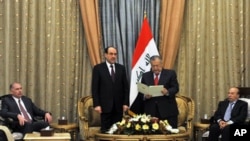Iraqi President Jalal Talabani formally nominated outgoing Prime Minister Nouri al Maliki Thursday to form the next government. The nod was widely expected and Maliki will now be tasked with bringing together both foe and friend in his new administration. The move had been agreed upon in a deal between rival political parties two weeks ago.
Maliki's nomination comes just over eight and a half months after a parliamentary election in which he won two fewer seats than his rival, former prime minister Iyad Allawi. The conflict between the two men over who would form the next government fueled what turned into a lengthy power vacuum.
President Talabani, who was himself elected by parliament recently to a second term, urged Mr. Maliki to reach out to all segments of the political spectrum in forming his new government.
He said he is confident that [Maliki] will reach out to all sectors of the nation, stressing that he will select someone from [Mr. Allawi's rival] Iraqiya bloc to be his deputy, and that no political forces will be excluded from the government. The constitution, he added, will be respected and parliament will play its role as the head of the legislative branch.
Maliki will formally have 30 days to put together his new government, although some observers think an agreement has already been reached over a number of key ministerial posts.
Challenges ahead
In accepting the nod, Maliki pointed out that the task facing him would not be simple.
He said that he and everyone else understands that the task which has been given to him is not a simple one, under the current circumstances. He insisted that he cannot accomplish the job alone and that everyone must work together to overcome the current critical situation. He also appealed to the Iraqi people, across the political and religious spectrum, to surmount their differences and conflicts and to cooperate.
The prime minister also vowed to improve the lot of the Iraqi people through better government services.
He insisted that government ministers and other political forces must work alongside him responsibly in the next session [of parliament] to reinforce security, to help rebuild the country and to restore services. He said that the previous government has concentrated on projects in the areas of electricity, oil, health services and education and that the coming years will see these projects come to fruition and will help improve the well-being of the Iraqi people.
The Iraqi press and opposition satellite channels have complained in recent months that parliament has sat idle, refusing to meet, while the country "disintegrated." Several newspapers even urged members of parliament to "give back their salaries" because they had done no work.
Iraq analyst Peter Harling of the Crisis Group in Damascus points out that Maliki, who now has 30 days to put together his cabinet, could still face a number of problems.
"We could look at possible stumbling blocks in terms of to what extent Maliki is willing to actually implement some of the commitments he made to redistributing effective power to others within the government."
Harling says Maliki has long come under fire from members of the opposition over concentrating power in the hands of his allies. The rival Aqiya bloc recently agreed to a power-sharing deal, but it remains unclear how this will work concretely.
Outgoing Iraqi PM Asked to Form New Government















